MercoPress. South Atlantic News Agency
Tag: science
-
Monday, September 17th 2018 - 08:44 UTC
UK/Argentina hold antimicrobial resistance scientific seminar in Buenos Aires
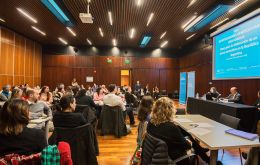
Scientists from different British universities, Argentine researchers and representatives of the organizing agencies took part this week in Buenos Aires in a seminar organized jointly by the Biotechnology and Biological Sciences Research Council (BBSRC) and the Natural Environment Research Council (NERC) from the UK, and the National Council for Scientific and Technical Research (CONICET) of Argentina.
-
Thursday, April 26th 2018 - 08:26 UTC
“World Penguin Day”: funny on land and graceful and rapid in the sea
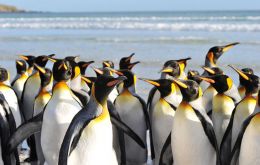
April 25th is “World Penguin Day”, undoubtedly the world’s most popular bird – think of Happy Feet, March of the Penguins, Pingu just to name a few uses in popular culture. These charismatic flightless birds are funny to watch on land but are graceful and rapid in water. They occur only in the seas of the Southern hemisphere; there are seventeen species of penguin ranging from the Galapagos to Antarctica.
-
Monday, February 26th 2018 - 09:09 UTC
UK/Brazil launch the Year of Science and Innovation 2018/19
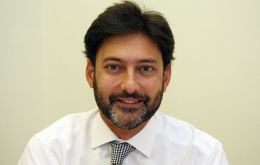
The UK-Brazil Year of Science and Innovation 2018-19, will be celebrated by a cocktail reception on 27 February at the Museum of Tomorrow during the visit of the British Royal Research Ship James Cook to Rio.
-
Tuesday, February 13th 2018 - 09:35 UTC
SCAR celebrates sixty year of international collaboration in Antarctica
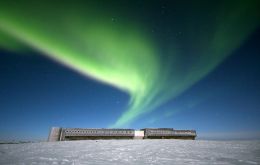
The Scientific Committee on Antarctic Research (SCAR), has celebrated six decades of successful international collaboration. Since its first meeting in The Hague on February 1958, SCAR has grown an international network of thousands of scientists who share a common ambition to carry out Antarctic science for the benefit of society.
-
Tuesday, January 30th 2018 - 08:54 UTC
Widespread antibiotic resistance to bacterial infections confirmed in WHO global testing
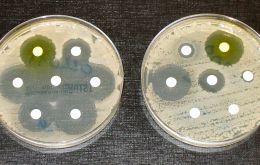
WHO’s first release of surveillance data on antibiotic resistance reveals high levels of resistance to a number of serious bacterial infections in both high- and low-income countries. WHO’s new Global Antimicrobial Surveillance System (GLASS) reveals widespread occurrence of antibiotic resistance among 500 000 people with suspected bacterial infections across 22 countries.
-
Thursday, January 18th 2018 - 09:21 UTC
Advanced research shows how cancer cells interfere with DNA genetic instructions
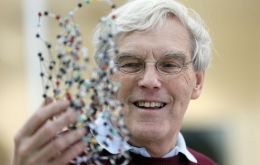
“Incredible” images of DNA in action have been captured by scientists who will use them to design cancer drugs. Researcher Dr Alessandro Vannini said the pictures were “beautiful” and in artistic comparisons were “definitely a Van Gogh”, since they capture a fundamental part of all plant and animal life, called RNA polymerase III, reading the genetic instructions contained in DNA. It is a process that gets hijacked by cancer.
-
Monday, January 15th 2018 - 10:35 UTC
British scientists join Chile's Future Congress to discuss humankind challenges
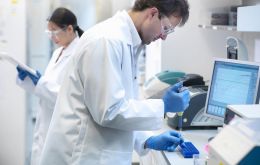
Twelve prominent British figures representing different areas of science, including economics, marine conservation and regenerative medicine, will be present the Future Congress between Monday January 15 and in Santiago and several Chilean regions.
-
Wednesday, December 13th 2017 - 23:59 UTC
Nobel Prizes criticize current US policy during the awards gala banquet

A United States researcher who shared this year's Nobel Prize for medicine bluntly criticized political developments in the US in his address at the awards' gala banquet Sunday night. Michael Rosbash, who was honored for his work on circadian rhythms — commonly called the body clock — expressed concern that U.S. government support such as that received by him and colleagues Jeffrey Hall and Michael Young is endangered.
-
Wednesday, May 12th 2010 - 19:43 UTC
Mexicans and Argentines Among the Happiest People, said Index

Mexicans and Argentines are among the happiest people, according to a Happiness Barometer Index tested in 16 countries which also confirmed that face-to-face time spent with friends and family makes people happier than socializing online.
-
Wednesday, May 12th 2010 - 00:06 UTC
Chile Gained 1.2 Square Kilometres Following the Earthquake
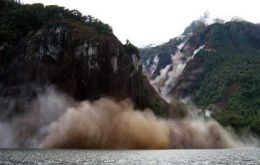
The Chilean territory expanded 1.2 square kilometres into the Pacific following the February earthquake that ravaged the centre and south of the country, according to Sergio Barrientos, head of the University of Chile Seismologic Institute.
